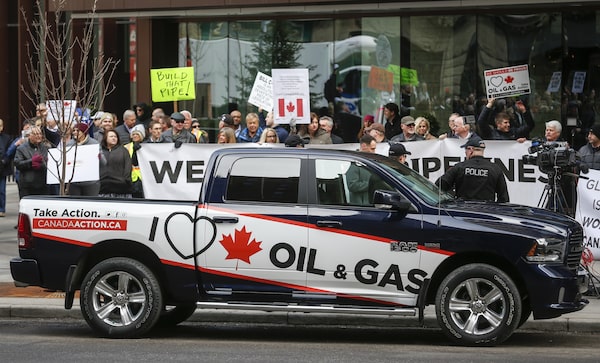
Pro-oil and gas supporters protest across the street as Federal Finance Minister Bill Morneau speaks to the Economic Club of Canada about the 2019 federal budget in Calgary, March 25, 2019.Jeff McIntosh/The Canadian Press
In the past, Alberta’s oil wealth has helped to soothe voter angst about risky investment bets.
But with the Biden administration’s revocation of the presidential permit for the Keystone XL project Wednesday – which could be the final stop for the controversial pipeline after more than a decade of stops and starts – that era might be over.
Albertans are learning this week that no project means the March, 2020, provincial government investment in TC Energy Corp.’s Keystone XL pipeline could cost at least $1.5-billion in public dollars, with no end reward of better access to American markets.
Canadian boosters appear to have been caught off guard by how quickly U.S. President Joe Biden has moved to halt the project, as he promised in May of last year – they believed they would have some time after his inauguration to make their case.
The decision to invest in Keystone XL is part of a line of Alberta government interventions done with an eye to wringing more wealth out of the province’s vast crude resources – by trying to get new pipelines built, buying crude-carrying trains, or trying to spur more domestic oil refining. It’s about gaining a modicum of control in an global oil industry ruled by geopolitics and other forces completely out of its control. The pipeline investment was made to get unemployed oil and construction workers back on the job, and secure better prices and market access for Alberta oil.
It wasn’t completely out-of-step with past Alberta government actions – which have also involved taxpayer dollars and had a high tolerance for risk.
Keystone is dead, and the remnants of NAFTA are Alberta’s best slim hope of getting its money back
The United Conservative Party government made the announcement that it would invest in Keystone XL at the end of March – which feels like a lifetime ago. It was the beginning of the pandemic. There was still a whiff of optimism the project was possible, whether it be under a second Trump term, or under a Biden administration that would reluctantly accept the project if it was already partly built, and was accompanied by support from American unions.
But not all market interventions are created equal. Given the province’s precarious financial state, the specific terms of the government investment and that it relied on approval in another country, Jason Kenney will wear his oil-infrastructure gambit in a way no other Alberta premier has.
It has received scant public attention, but Sturgeon refinery just outside Edmonton is likely the costliest of Alberta government energy projects. It was seeded a decade ago to create more upgrading and refining jobs in Canada, and was built only because there were Alberta government loan guarantees. The refinery started full operations in 2020 after years of delays and cost overruns. The “onerous contract provision” the province has with the refinery was valued at negative $2.52-billion, according to the province’s energy department.
In reflecting on the refinery investment, former Alberta cabinet minister Ted Morton – who said he expressed internal dissent as part of Progressive Conservative governments that signed onto the refinery gambit – wrote that such projects tend to be motivated by politics. He also said there’s often no independent, professional assessment of a project’s long-term economic viability, and governments tend to be out-negotiated by more experienced counterparts in the private sector. Governments often take most of the risk, provide most of the capital and receive little of the profits – if there are any. It remains to be seen whether these factors apply in the case of Keystone XL.
NDP Leader Rachel Notley – premier between 2015 and 2019 – argued this week her government’s own version of support for the Keystone XL pipeline was “cautious and prudent,” committing 500,000 barrels of government oil for shipping once the pipeline was actually built. Ms. Notley’s government also invested $3.7-billion to lease thousands of railcars in 2019 – again, because of a lack of export capacity (a contract the Kenney government cancelled once in office).
Her government would not have completely ruled out an investment in the Keystone XL pipeline, says NDP spokeswoman Leah Ward, but it wouldn’t have been large sums with no strings attached. It would have also been accompanied by strong action on climate, not energy war rooms, she said.
Globe reporters have been asking the UCP government for further financial details on the arrangement with TC Energy for months. It’s now clear the exposure risk for Alberta is about $1-billion in equity, and $400-million in loan guarantees to provide for TC Energy construction commitments already made this month and in February. The $400-million cost is at risk even though the Alberta Premier promised last year the loan guarantees wouldn’t come into force if the project is cancelled.
Mr. Kenney is calling for Ottawa to launch a trade war but the federal government is signalling it will accept the Biden administration order to focus on areas where the two governments can find alignment. With the many challenges to the oil industry today, including a lack of pipeline access and changing investor sentiment, the long-standing Alberta belief that growth follows a trough is being severely challenged. The provincial government has a much deeper financial hole to crawl out of this time, and Albertans will be more demanding in seeking an explanation.
Keep your Opinions sharp and informed. Get the Opinion newsletter. Sign up today.
 Kelly Cryderman
Kelly Cryderman